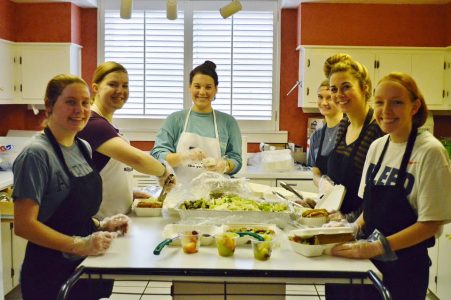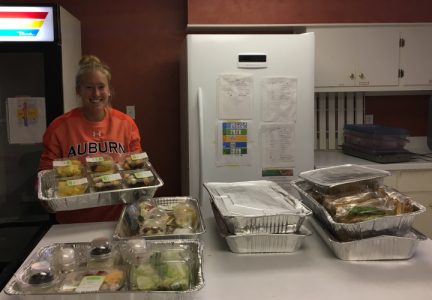Post contributed by Kenzley Defler, Office of Sustainability Intern
Like many college students, I’m often told the importance of getting involved on campus in order to make connections and build a resume. Last year in early January, I thought about this advice and decided to take heed by searching AU Involve, Auburn’s online directory of all student organizations. I have always been passionate about the environment and sustainability, so I focused my search on these themes. While Auburn has many opportunities in this area, one group in particular caught my attention- The Campus Kitchens Project. I had never heard of the organization before but “fighting hunger and food waste” definitely seemed like a club I would be interested in. After attending a meeting and volunteering at a couple of weekly shifts, I could already see the positive impact made by Campus Kitchens and couldn’t wait to get more involved.
The Campus Kitchens Project focuses on eliminating food waste and fighting food insecurity by donating unserved food to community members in need. In the United States, 40% of food is wasted each year, while 1 in 6 people don’t know where their next meal will come from. The Campus Kitchens Project strives to fight these startling statistics in student-powered initiatives focused on strengthening bodies, empowering minds, and building communities. This academic year, 53 schools across the nation have a Campus Kitchens Project running, with about 28,700 student volunteers involved.
At Auburn, this program has been developed into a student-led group offering volunteer opportunities in the form of three different kinds of shifts. Each week over 70 volunteer slots are open in 29 total shifts, each of which is led by a shift leader. At pickup shifts we go to Tiger Dining kitchens and pick up any extra food they have, which is then used in packaging shifts to assemble nutritious meals. Delivery shifts are responsible for distributing the food collected in the form of meals or entire pans, depending on the need of each community partner. Currently Auburn collects food from 8 campus dining locations and donates to 14 community partners, such as Our House, His Place, Salvation Army, Harbor House, Esperanza House, and Meals on Wheels.
One of my favorite aspects of working with Campus Kitchens is being involved with other students from all over campus to make changes in our local community. In Lee County, 18% of people are food insecure and the work done by Campus Kitchens is striving to make a difference. The individuals and community partners we serve are extremely grateful for the food they receive, and I’m humbled to be able to help through my work with Campus Kitchens. Interacting with the community has been a highlight for me because I enjoy meeting new people and making a difference for them in any way possible. Because I have always been very environmentally focused, I also appreciate that we can decrease the amount of food being thrown into a landfill by picking up food from dining halls. I find it appalling how much food can be wasted, either from students’ plates or from the kitchens, so it’s encouraging to fight against this food waste. In 2016, we recovered 14,136 pounds of food and served 11,109 meals! Looking at what our group did in just a single year is motivating and proves that the impact of our weekly works adds up quickly.
In addition to recovering food to be given out, Campus Kitchens hosts several events throughout the year to involve and educate the Auburn community. For example, last fall we partnered with the Committee of 19 to show the documentary Just Eat It: A Food Waste Story. This powerful film focused on a couple that only ate off of wasted food, i.e. food that would otherwise have been thrown away, for six months. The images shown of entire dumpsters filled with perfectly edible food that was being thrown out were shocking and eye opening. This documentary was a concrete visualization of the food waste problem being fought by Campus Kitchens.
One of my favorite events we hosted was a dinner banquet for EASE House. East Alabama Services for the Elderly focuses on providing life-sustaining services to senior citizens in Lee and Russell Counties. Last spring, Campus Kitchens partnered with Tiger Dining to plan a meal for some of the residents who came to Auburn’s campus for dinner. We helped set up and serve dinner to the residents and also got the chance to visit with them during the meal. Not only are events like this lots of fun, they provide a great way to interact with individuals in the community on a more personal level.
Since beginning to volunteer and becoming part of the leadership team of Auburn’s Campus Kitchens Project, I’ve learned so much about food waste and food insecurity and have seen the importance of breaking this cycle. It’s become a topic I’m passionate about and something I could see myself pursing in my future career. My involvement with the organization may have started out as an activity to put on a resume, however, it’s become so much more than that to me. I’m grateful for the lessons I’ve learned, the people I’ve met, and most importantly, the opportunities I’ve had to make a difference in the community through my work with the Campus Kitchens Project at Auburn.






